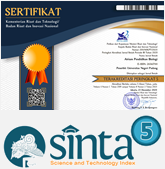LEARNING PHYSICS USING RESEARCH-BASED MODELS WITH SCIENTIFIC APPROACHES TO IMPROVE STUDY PROBLEM SOLVING SKILL
Abstract
Keywords
Full Text:
FullpaperReferences
Arifin, P. (2010). Research Based Learning National Seminar Paper. Bandung: Institut Teknologi Bandung.
Arikunto, Suharsimi. (2008). Fundamentals of Educational Evaluation. Jakarta: Bumi Aksara.
Branch, Robert Maribe. (2009). Instructional design: the ADDIE Approach. New York: Springer.
Fauzan, A. (2002). “Applying Realistic Mathematics Education (RME) in Teaching Geometry in Indonesian Primary Schools”. Thesis pada University of Twente. Tidak diterbitkan.
Hamzah B. Uno. (2007). Motivation Theory and Measurement Analysis in the Field of Education. Jakarta: Bumi Aksara.
Poonpan, S. (2001). Indicators of Research – Based Learning Instructional Process: A Case Study of Best Practice in a Primary School. Bangkok.
PUPBR Indonesia. (2010). General Guidelines for Research-Based Learning Universitas Gadjah Mada. Diperoleh 25 Desember 2012 dari http://ppp.ugm.ac.id/wp- content/uploads/pupbrindonesia.pdf
Sanjaya, Wina. (2006). Standard Oriented Education Process Learning Process. Jakarta: Inter Pratama.
Solso, dkk. (2007). Cognitive Psychology. Jakarta: Erlangga.
St. Sunarto. (2005).” How to Carry out Classroom Action Research (Classroom Action Research)”. Regional Education Development and Improvement Program (REDIP): JICA (Dimodifikasi dari Maribe, 2009)
Sudjana, N. (2006). Assessment of Teaching and Learning Results. Bandung: Remaja Rosdakarya.
Supriyono, Koes H. (2003). Physics Learning Strategy. Malang. JICA-IMSTEP
Wardoyo, Sigit Mangun. (2013). Research Based Learning. Jakarta: Akademia Permata.
Yahya, I. (2010). Four-Step Management in the Development of Research and Teaching- Based Teaching Materials in a Perspective RET/L. Surakarta: UNS.
Tremp, Peter. (2010). Research-based Teaching and Learning A LERU project. Munich: University of Zurich, Center for UniversityTeaching and Learning.
Guinness, Patrick. (2012). Research- Based Learning: Teaching Development Through Field Schools. Journal of Geography in Higher Education.
Poonpan, Suchada & Siriphan, S. (2001). Indicator of Research- Based Learning Instructional Process: A Case Study of Best Practice in a Primary School”, Faculty of Education, Chulalongkorn University Phaya Thai. Bangkok.Thailand.
Tall, D.O. (2002). Cognitive Growth in Elementary and Advanced Mathematical Thinking. Conference of The International Group for the Psychology of Learning- Mathematics, Recife, Brazil, July 1995, Vol I.
Pierce, B. (2002). “Genetics: A Conceptual Approach”. New Work: W. H. Freeman Ltd.
Tobin, K. G. & Capie, W. (1981). Patterns of Reasoning: Probabilistic Reasoning. Paper Presented at Annual Meeting of The National Association for Research in Science Teaching, New York.
Runco. & Chand (1995) Runco, M.A. and Chand, I. (1995) Cognition and Creativity. Educational Psychology Review, 7, 243-267.
Sungur, S & Tekkaya, C. (2006). Effects of Problem-Based Learning and Traditional Instruction on Self- Regulated Learning.The Journal of Education Research. Accessed on July 5, 2014.
DOI: http://dx.doi.org/10.24036/apb.v6i2.11371
DOI (Fullpaper): http://dx.doi.org/10.24036/apb.v6i2.11371.g4702




